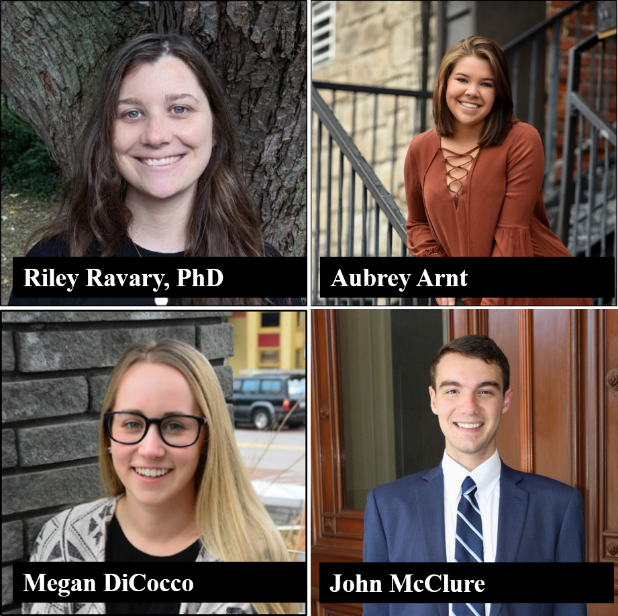Fall 2023 eNewsletter
Expanded CIGLR Research Engagement Team Facilitates Connections Between Scientists and Society in the Great Lakes Region
CIGLR’s mission is to lead research, develop applications and products, and engage end users to achieve environmental, economic, and social sustainability in the Great Lakes. The Research Engagement program at CIGLR is led by researcher-practitioners who seek to inform the design of CIGLR and NOAA GLERL research and products through the experiences, needs, and knowledge of stakeholders, rights-holders (individuals or social groups that have particular entitlements), and end users, and ultimately ensure successful service delivery in line with CIGLR’s mission.

The CIGLR Research Engagement team is growing and currently consists of four specialists: Riley Ravary, PhD (top left), Aubrey Arnt (top right), Megan DiCocco (bottom left), and John McClure (bottom right).
Research engagement is a two-way interaction between researchers and end-users for the mutually beneficial development and transfer of knowledge, policy decisions, technologies, products, methods, management actions, or other outcomes. Our program has four objectives:
-
- to identify stakeholders, rights-holders, and end-users; build meaningful relationships; and support existing relationships for CIGLR and NOAA GLERL research projects and products,
- to ensure that research products are useful and usable by involving stakeholders and rights-holders in every stage of a project,
- to bridge the gap between scientists and end-users to ensure knowledge and research outcomes translate effectively to decision support and operations, and
- to conduct social science research on topics relating to our work.
The CIGLR Research Engagement team is growing and currently consists of four specialists. Riley Ravary is the Lead Research Engagement Specialist. She joined CIGLR in October 2022, shortly after completing her Ph.D. in Cultural Anthropology at the University of Florida. Megan DiCocco, Research Engagement Specialist, re-ignited the Research Engagement program as the first hire to our team in June 2022. Megan joined CIGLR following the completion of her M.S. in Ecosystem Science and Management at the University of Michigan’s School for Environment and Sustainability. Aubrey Arnt and John McClure joined CIGLR as Research Engagement Specialists earlier this fall. Aubrey is currently finishing her M.A. in Food Studies (Global Sustainable Production and Consumption) at the American University of Rome. John recently completed his M.S. in Environmental Justice and Environmental Policy and Planning at the University of Michigan’s School for Environment and Sustainability.
“Our team collaborates on multiple projects across CIGLR’s entire research portfolio,” said Ravary. “Currently we are working on nine projects–two in water level forecasting and modeling, two related to capacity building and decision support, four focused on ecological forecasting and monitoring, and one related to ice modeling. In our work, we engage end-users, stakeholders, and rights-holders in the research and product design process through collaborative design–or co-design–to ensure the products we create at CIGLR and NOAA GLERL are useful, usable, accessible, and efficient. We facilitate the interaction of stakeholders, rights-holders, and end-users with researchers, fostering opportunities for them to actively participate in product design and co-produce knowledge.”
CIGLR’s Research Engagement team utilizes the combined scientific, technical, practical, traditional, local, and experiential ways of knowing held by co-designers and researchers to improve a product’s usability and usefulness. Co-design might involve informal discussions, interviews, focus groups, surveys, usability tests, workshops, or other facilitated modes of participation.
“Our work is highly collaborative and funded through research projects–we are always interested in working on new projects and developing relationships to advance Great Lakes science and enhance societal impacts,” said Ravary.
If you’d like to learn more about CIGLR’s Research Engagement program, please take a look at this informational slide deck or email Dr. Ravary at [email protected].
